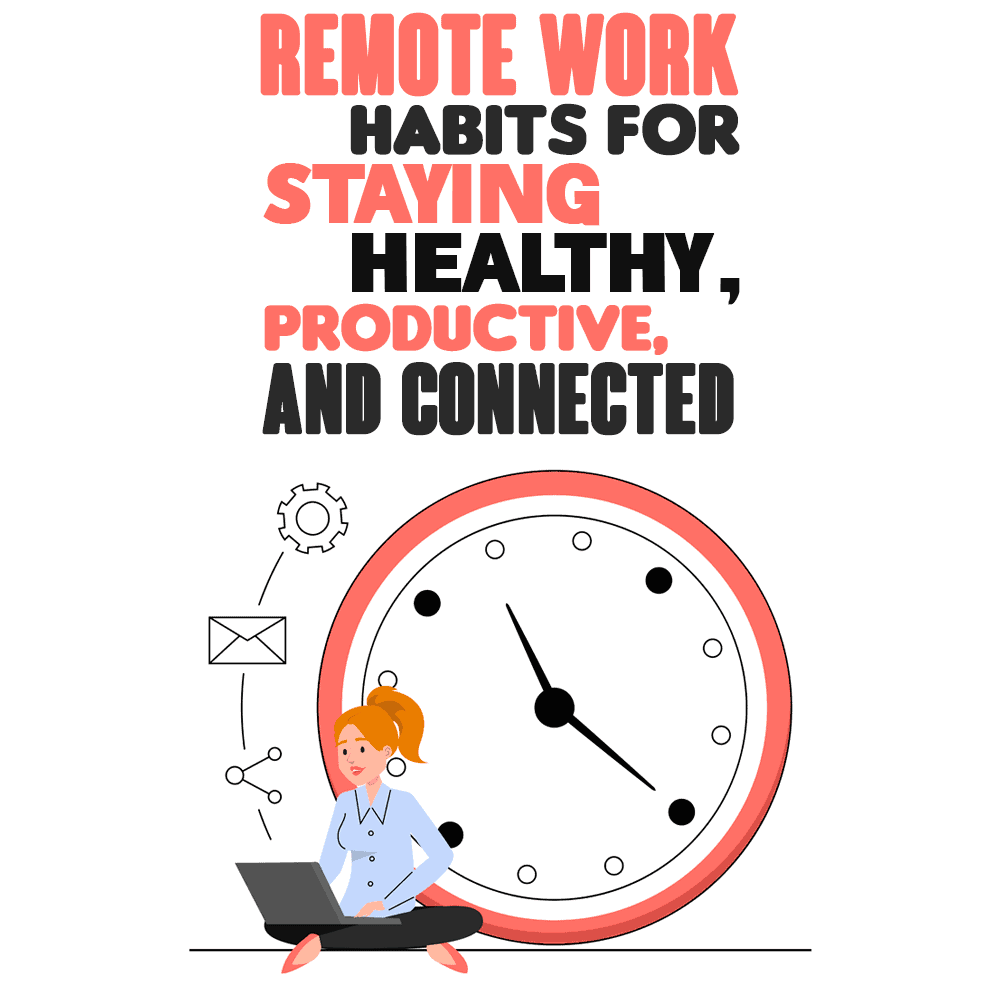 Remote work habits that allow you to stay connected, sane, and productive are essential for anyone looking to maintain a good quality of life while working remotely. For programmers, it’s particularly vital because we’re often introverts who don’t always thrive in an open office environment. Showing you can be productive from a remote office encourages employers to keep this working model.
Remote work habits that allow you to stay connected, sane, and productive are essential for anyone looking to maintain a good quality of life while working remotely. For programmers, it’s particularly vital because we’re often introverts who don’t always thrive in an open office environment. Showing you can be productive from a remote office encourages employers to keep this working model.
Furthermore, even if you’re the opposite of that and love working around people but now find yourself working remotely, practicing the right habits can help you stay connected, productive, and feel like part of the team.
Remote programming work doesn’t have to be isolating if done right. Here are some habits to inspire and motivate you to find ways to improve your life, both professionally and personally.
Pre-Plan Your Next Day’s To-Do List
As a programmer, you can plan your day ahead by creating a to-do list the night before. This will help ensure that you’re productive and efficient throughout your workday, since it forces you to consider what needs to be prioritized. Planning ahead allows for more flexibility because, if something comes up unexpectedly, you can shift your priorities around as needed. Make use of free tools and services to help make your life flow a little easier…
Make sure to plan out the day without getting too specific, or else it will create unnecessary stress and overwhelm you. In other words, don’t schedule every minute of your day. Instead, set a loose agenda so that, if something comes up during the course of working, you have wiggle room with your schedule. Include your top three tasks for the day, and then add in a few miscellaneous things that you can also get done.
Sort Tasks According to Priorities
One of the biggest problems for programmers working from home, and other remote workers, is that it can be difficult to determine which tasks are a priority. It’s very easy for a high-priority task to get lost in the sea of low-priority items. To fix this problem, here is what you can do:
- Sort tasks into three different categories (high, medium, and low priority)
- Use a time tracking tool to track your time and monitor how much work you perform on each task. This will allow you to see where your most productive hours are so that you spend more of those times working on higher-priority items. You’ll also notice that you get more done in less time.
- Track how much social media and entertainment websites are using up your time and work on reducing the number of hours spent on these sites each day/week/month (depending on what works for you).
Remember that sorting tasks will help you avoid dealing with last-minute stress and panic that can occur when you’re overwhelmed by a large number of tasks. You don’t want to find yourself dealing with programming anxiety or depression. Find a way to plan out your work routine so that you stay on track with deadlines.
Relax Your Mind and Ensure Your Have Adequate Rest
Spending too much time working in front of a screen can easily lead to burnout, depression, and overall dissatisfaction with your job. Getting sleep is the best thing you can do for yourself. It can be hard when you’re very passionate about what you’re doing, but taking some time off every week to rest, refresh your mind, and exercise will benefit your mental health and productivity levels.
Whatever option you choose to relax, the most important thing is ensuring it helps you stay focused and on task. Your well-being is a priority, so please do not forget about it.
Set up a Comfortable Remote Working Environment
Ensure that your remote work environment is as comfortable as possible. Remote working doesn’t mean you should be working from your bed or in a crowded cafe. You want to create an environment that is free of distractions and has the right amount of privacy for you. While you can’t always do this, try to follow these tips as much as possible.
- Set up dedicated work hours when no one bothers you
- Find out what kind of desk situation works best for you—whether that’s a standing desk or you’re seated
- Invest in an ergonomic chair if you spend a lot of time sitting down
- Find out the best lighting for you to work in—natural or artificial?
- Include whatever makes you feel like you’re in your work zone—it could be some cool music, calming instrumentals, or your favorite movie soundtrack
- Have a bottle of water close by; or coffee, if it helps you, but go easy there
- Get the desk essentials you need—pen and notebook, etc.
- Get a self-watering plant to keep you company on your desk
- Take the time to differentiate between working and not working. The lines can blur when you’re working from home. Take a walk, call a friend, or even vape your favorite herbs to unwind when you’re done for the day.
Engage in Wellness Activities To Stimulate Your Mind and Body
Meditating and practicing yoga are by far the most effective activities shown to reduce stress, improve mood, increase focus and mental acuity—not to mention improve flexibility. Working from home can be isolating at times, so this is a great way for you to connect with your inner self through mindful practices without leaving your house or home office.
Take a few moments every day to meditate or do a few yoga poses. Don’t worry about how you look. Just focus on your breathing and allow yourself to be in the moment. This will result in more clarity, creativity, and productivity overall.
Just like any exercise, you must start slow and work your way up to longer sessions. Don’t forget about healthy meals. Start your day with a healthy breakfast. For your brain to function at peak performance, you need to give it the right nutrients throughout the day. You shouldn’t skip meals, especially when you’re working from home.
Find Simple Ways to Stay Connected

Regular calls with your family and friends are also vital. If you have a hard time staying in touch, try video chat or screen sharing, so it’s easier to communicate. Use social media as a way of keeping up with what everyone is doing, even though this can be distracting. You don’t want to miss out on things that are happening in the lives of those around you. Keep in mind that by changing your remote working habits, you get to achieve long-term positive growth.
The Key Is Maintaining a Professional and Personal Life Balance
In conclusion, working remotely is great for many reasons. For many people, it has definitely made life healthier, more productive, and much easier than it would be if they had stayed in an office. Unfortunately, bad habits can creep up on you and have a negative impact on your health, productivity, and connection to the world around you. The key is maintaining a balance between both worlds.
You want to maintain that professional life where you’re still getting things done without sacrificing personal time, allowing for creativity, inspiration, and motivation in other areas of your life. This could be family time with children or playing sports. Go ahead and give yourself some time to indulge in things you enjoy doing, as it will ultimately help your work and productivity.
